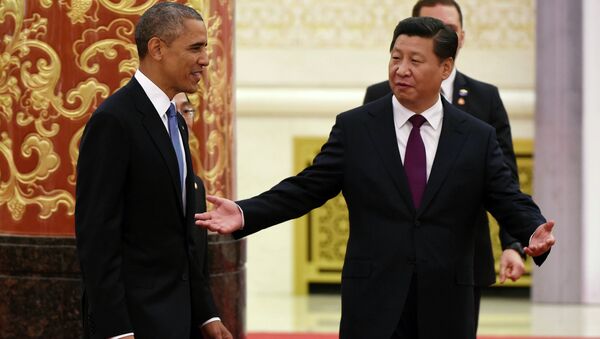WASHINGTON, November 13 (Sputnik) — The greenhouse gas emissions deal reached by US President Barack Obama and Chinese President Xi Jinping on Wednesday is an ambitious step aimed to fighting climate change, but may be difficult to implement, experts told Sputnik.
"The goals [on climate change] are ambitious, but more aspirational than attainable," Asia Analyst from the Woodrow Wilson International Center for Scholars Michael Kugelman told Sputnik Wednesday.
Kugelman argues that reaching an attainable deal on greenhouse gas emission is hard for both countries because China is still very dependent on coal and the United States faces a less climate friendly Republican led Congress and Senate.
The deal could trigger "partisan paralysis in Washington," Kugelman added.
Communications Director for Climate Change at the Environmental Defense Fund Keith Gaby agreed that a commitment from China on climate change will most likely be heavily debated in Washington.
"There will obviously be a debate about it [the climate deal], [but] I think the President [Obama] has the authority to move forward with this", Gaby told Sputnik.
"In the past, a lot of opponents on climate change have said that we [the United States] shouldn't act unless China does… now that China is taking action… that takes that excuse always," the communications director said.
Gaby however stated that the deal is "a huge step forward, you've got the two largest economies in the world agreeing to shift towards clean energy."
"In the last century oil was the quickest path to wealth and power. In the new century it's going to be clean technology and whoever wins that race is going to have a significant advantage… so this move can push their economies towards dominating those areas," Environmental Defense Fund communications director added.
Associate Professor for Science, Technology and International Affairs at Georgetown University, Joanna Lewis added that the United States and China's climate announcement means that more countries will likely follow their lead on similar deals, but that China especially will likely have difficulty in reaching its 2030 goal because the country is still so dependent on coal.
"The joint announcement will likely build momentum ahead of the G20 meetings… and hopefully lead to similar announcements by other countries," Lewis told RIA Novosti.
"Achieving an emissions peak is dependent on coal use also peaking likely several years in advance of any CO2 peak, which will be extremely difficult for China to achieve."
China and the United States have committed to transitioning to low-carbon economies by decreasing their emissions. The United States intends to reduce its carbon emissions by 28 percent in 2025, while China plans to increase its share of non-fossil fuels used in primary energy consumption to about 20 percent by 2030, according to a White House press release on the joint announcement.


